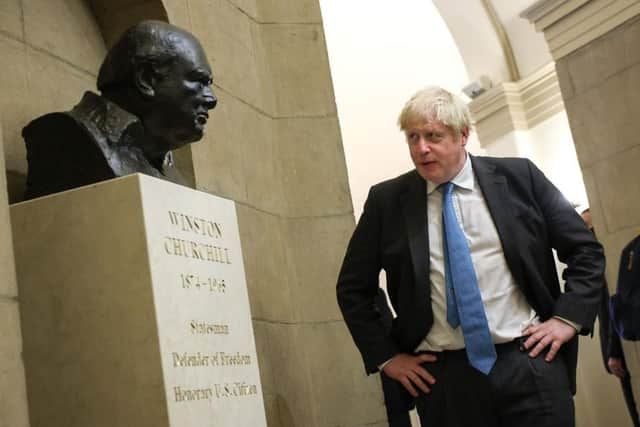Cost-of-living crisis: Johnson's government needs wartime-style economic plan, not a trade war with EU – John McLellan
Don’t blame the service station because the RAC Foundation estimates the current margin, the amount the forecourt makes, is just under 4p. By comparison, 49.47 per cent of your petrol cost and 46.79 per cent of your diesel goes to the Chancellor in duty and tax, including 20 per cent VAT, and that’s after the 5p duty cut announced by Rishi Sunak at the end of March.
As was very quickly pointed out at the time, the rapid rise in fuel prices meant that the cut wouldn’t be noticed and for the £2.4 billion hole the gesture burnt in his budget he and the UK Government have received no credit or political benefit, even though it will save the average one-car family £100 a year.
Advertisement
Hide AdAdvertisement
Hide AdAfter the Bank of England raised interest rates by another quarter point to one per cent, reports yesterday suggested that increasingly nervous Cabinet ministers were putting the Chancellor under pressure to cut all VAT rates and reduce Corporation Tax to stimulate the economy, as fears grow about a full-blown recession later this year.


It all feels pointlessly complex when the cost-of-living crisis was obvious at the start of the year and the calls to cancel the National Insurance rise were ignored. If Downing Street wants to preserve the party’s reputation for financial competence, then introducing one tax rise only to bring in a raft of compensating cuts to other levies would look more like panic measures than a properly considered anti-recession strategy.
That “something must be done” is unarguable, but the question is what? And as the Blue Wall of the South appeared to be crumbling yesterday morning with the end of decades-long Conservative control of London boroughs – and early results in Scotland looked disastrous for the Conservatives in general and Douglas Ross in particular – the demands for action from within the party will only intensify.
Whether it was Partygate, the cost of living, or both, slashing Corporation Tax as a business stimulant would go down like a delivery of horse manure in your bedroom at a time when thousands of families are struggling to make ends meet. All the Laffer Curve optimism of lower business taxes producing higher tax revenues will butter no parsnips with an electorate possibly just 18 months away from a General Election.
It was all very well for the Prime Minister to admit this week that not enough had been done to tackle soaring domestic costs when plenty of Conservatives had called both for the NI hike to be scrapped and the temporary Universal Credit uplift to be retained; opportunities to alleviate financial pressure on the most needy were there, but they were trumped by the competing need to control public finances after two years of Covid emergency spending.
It’s the Chancellor’s job to worry about record interest payments of an estimated £70bn on a national debt of £2.3 trillion, but if those same Cabinet ministers calling for tax cuts are true to their Conservative roots then they should also be presenting Messrs Johnson and Sunak with their departmental savings plans.
As the Ukraine War lengthens and global fuel and food costs continue to rise, the UK Government is dealing with what is becoming a wartime economic situation without a wartime economic plan or wartime messaging.
When Covid’s grip rapidly tightened at the start of 2020, both the UK and Scottish Governments were quick to introduce and communicate the most severe restrictions on our liberties in 70 years and everyone meekly obeyed because they could see the mounting death toll every night on the TV news.
Advertisement
Hide AdAdvertisement
Hide AdNow the nightly fatality reports are coming from Ukraine and, as the financial repercussions are severe, the UK Government can’t re-set everything to pre-2020 normality when the world is an entirely different place.
Not only is the Cold War back, with the Hammer and Sickle replaced by the double-headed Imperial Russian eagle, but world supply chains have not returned to normal and will continue to be hampered by the resurgence of Covid in China and the regime’s severe zero-Covid strategy.
For all the talk of levelling up, the government needs to level with the public about what we face, yet other reports coming out of Whitehall this week suggest Tuesday’s Queen’s Speech will include a bill designed to break the impasse over the Northern Ireland Protocol, but which could provoke a trade war with the EU at a time when relations needs to be smooth.
From any perspective, a foreign bloc imposing an internal trade barrier within another state is unacceptable, but forcing the issue now could have ramifications which make steering a course to recovery even more treacherous.
Intriguingly, the Fraser of Allander Institute/Addleshaw Goddard’s quarterly Scottish Business Monitor revealed that the 500 Scottish firms surveyed were largely optimistic about the next six months, but it didn’t include exporters and the upbeat tone was tempered by concerns about energy costs, recruitment and difficulties in sourcing goods and services. Almost 90 per cent expected above-average price increases, including all hospitality and food firms in the survey, which spells bad news for consumers.
If there is wriggle room which doesn’t look like a U-turn, it’s the pledge alongside the National Insurance increase to cut income tax before the next General Election.
A last-minute giveaway won’t wash if spiralling costs have already forced thousands into previously unthinkable compromises, so the Autumn Budget is the ideal time to fulfil that promise.
That it would pressurise the Scottish Government to follow suit when it might be trying to build a war chest for some sort of referendum campaign in 2023 should be a welcome by-product, and the Scottish Conservative fuel tank is in urgent need of filling.
Comments
Want to join the conversation? Please or to comment on this article.

